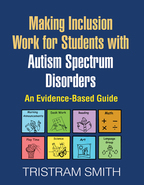Making Inclusion Work for Students with Autism Spectrum Disorders
An Evidence-Based Guide
Tristram Smith
“More and more learners with ASD are being placed in general education settings, and there is a real need for practical resources to help educators meet these students' needs. This comprehensive, clearly written book provides a foundation for designing and implementing high-quality, evidence-based instruction. Both special and general educators will find much of value here. Instructors who teach courses on inclusion of students with ASD will find this book to be an excellent option for their classes.”
—Richard L. Simpson, EdD, Department of Special Education, University of Kansas
“This is a very useful book! It is full of examples of specific activities and strategies for educating children and adolescents of all ages who have symptoms of varying severity. It is written with clarity and ease of access. The book is quite a treasure for launching new teachers into their classroom careers; for experienced teachers who need to update their skills to be effective with learners with ASD; and for school psychologists.”
—Sandra L. Harris, PhD, Board of Governors Distinguished Service Professor Emerita, Rutgers, The State University of New Jersey
“In recent years, there have been major advances in interventions for young children with ASD, and Smith has been one of the foremost workers in this field. However, the transition from specialized early intervention programs to more integrated settings continues to present major challenges. This book fills a gap by offering a wealth of information about strategies for enhancing children's learning and encouraging successful integration. It will be of enormous benefit to educators working to help students with ASD succeed in inclusive classrooms.”
—Patricia Howlin, PhD, Professor of Clinical Child Psychology, King’s College London, United Kingdom
“This book should be on the desk of every teacher and special educator working with children with ASD. The book gives concrete information on how to use evidence-based procedures in general education. It is comprehensive, highly readable, and filled with useful examples and worksheets.”
—Svein Eikeseth, PhD, Founder and Clinical Director, NOVA Institute for Children with Developmental Disorders, Norway
“This excellent book describes how to create a successful inclusive environment for learners on the autism spectrum. Smith combines his scholarly knowledge of the spectrum with his practical experience in helping individuals reach their potential. A 'must have' for educators.”
—Brenda Smith Myles, PhD, consultant, Ziggurat Group, Plano, Texas
Table of Contents
I. General Considerations1. Autism Spectrum Disorders
2. Evidence-Based Interventions and Supported Inclusion of Students with ASD
II. Preparation
3. Evaluating the Student, Caroline I. Magyar, Vincent Pandolfi, and Robin Bender
4. Planning Data Collection and Monitoring Progress, Daniel W. Mruzek
5. Team Building and Training, Christine Peterson
6. Preparing the Student: Transition from Special Education to Inclusive Settings, Dennis Mozingo and Mae Barker
III. Implementation
7. Adapting the Daily Routine
8. Individualizing the General Education Curriculum
9. Individual Instruction, Part 1: Teaching Approaches, Daniel W. Mruzek, Laura Silverman, and Betsy Varghese
10. Individual Instruction, Part 2: Examples and Teaching Programs
11. Peer Interaction, Tasha C. Geiger
12. Problem Behavior, Deborah A. Napolitano and David B. McAdam
13. Sustaining Inclusion: Systems Change, Christine M. Burns and Linda L. Matons
About the Author
Tristram Smith, PhD, until his death in 2018, was Haggerty–Friedman Professor in Developmental/Behavioral Pediatric Research at the University of Rochester Medical Center (URMC). He joined the faculty of URMC in 2000. Dr. Smith's pioneering research on behavioral interventions changed the landscape of care for children with autism spectrum disorders (ASD). He authored or coauthored several of the most widely cited studies on treatment outcomes for children with ASD.Contributors
Mae Barker, PhD, Center for Autism and Related Disabilities, University of Florida College of Medicine, Jacksonville, FloridaRobin Bender, LMSW, Department of Clinical and Social Sciences in Psychology, University of Rochester, Rochester, New York
Christine M. Burns, MEd, Department of Pediatrics, University of Rochester Medical Center, Rochester, New York
Tasha C. Geiger, LP, PhD, Bluegrass Regional Mental Health–Mental Retardation Board, Lexington, Kentucky
Caroline I. Magyar, PhD, Department of Pediatrics, University of Rochester Medical Center, Rochester, New York
Linda L. Matons, MA, Department of Pediatrics, University of Rochester Medical Center, Rochester, New York
David B. McAdam, PhD, Department of Pediatrics, University of Rochester Medical Center, Rochester, New York
Dennis Mozingo, PhD, Department of Pediatrics, University of Rochester Medical Center, Rochester, New York
Daniel W. Mruzek, PhD, Department of Pediatrics, University of Rochester Medical Center, Rochester, New York
Deborah A. Napolitano, PhD, Department of Pediatrics, University of Rochester Medical Center, Rochester, New York
Vincent Pandolfi, PhD, Department of School Psychology, Rochester Institute of Technology, Rochester, New York
Christine Peterson, PhD, Department of Pediatrics, University of Rochester Medical Center, Rochester, New York
Laura Silverman, PhD, Department of Pediatrics, University of Rochester Medical Center, Rochester, New York
Betsy Varghese, MD, Department of Neurology, State University of New York Upstate Medical University, Syracuse, New York
